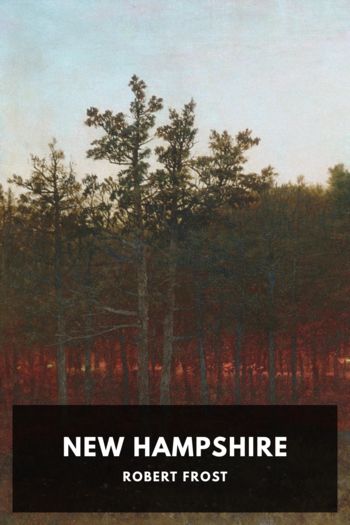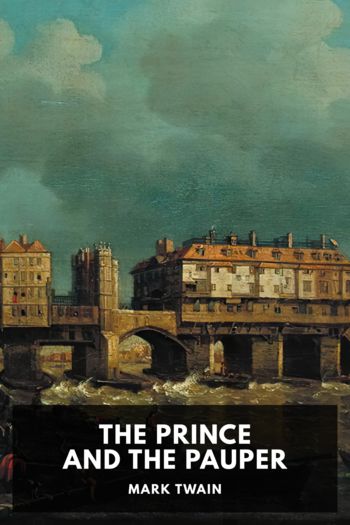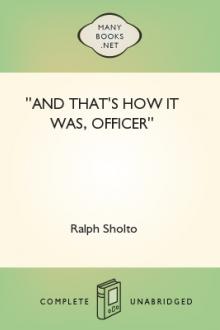New Hampshire by Robert Frost (i love reading .TXT) 📕

- Author: Robert Frost
Book online «New Hampshire by Robert Frost (i love reading .TXT) 📕». Author Robert Frost
“Why not take two or three?”
“Take all you want.
Good-looking books like that.” He picked one fresh
In virgin wrapper from deep in the box,
And stroked it with a horny-handed kindness.
He read in one and I read in another,
Both either looking for or finding something.
The attic wasps went missing by like bullets.
I was soon satisfied for the time being.
All the way home I kept remembering
The small book in my pocket. It was there.
The poetess had sighed, I knew, in heaven
At having eased her heart of one more copy—
Legitimately. My demand upon her,
Though slight, was a demand. She felt the tug.
In time she would be rid of all her books.
It was long I lay
Awake that night
Wishing the tower
Would name the hour
And tell me whether
To call it day
(Though not yet light)
And give up sleep.
The snow fell deep
With the hiss of spray;
Two winds would meet,
One down one street,
One down another,
And fight in a smother
Of dust and feather.
I could not say,
But feared the cold
Had checked the pace
Of the tower clock
By tying together
Its hands of gold
Before its face.
Then came one knock!
A note unruffled
Of earthly weather,
Though strange and muffled.
The tower said, “One!”
And then a steeple.
They spoke to themselves
And such few people
As winds might rouse
From sleeping warm
(But not unhouse).
They left the storm
That struck en masse
My window glass
Like a beaded fur.
In that grave One
They spoke of the sun
And moon and stars,
Saturn and Mars
And Jupiter.
Still more unfettered,
They left the named
And spoke of the lettered,
The sigmas and taus
Of constellations.
They filled their throats
With the furthest bodies
To which man sends his
Speculation,
Beyond which God is;
The cosmic motes
Of yawning lenses.
Their solemn peals
Were not their own:
They spoke for the clock
With whose vast wheels
Theirs interlock.
In that grave word
Uttered alone
The utmost star
Trembled and stirred,
Though set so far
Its whirling frenzies
Appear like standing
In one self station.
It has not ranged,
And save for the wonder
Of once expanding
To be a nova,
It has not changed
To the eye of man
On planets over
Around and under
It in creation
Since man began
To drag down man
And nation nation.
Why make so much of fragmentary blue
In here and there a bird, or butterfly,
Or flower, or wearing-stone, or open eye,
When heaven presents in sheets the solid hue?
Since earth is earth, perhaps, not heaven (as yet)—
Though some savants make earth include the sky;
And blue so far above us comes so high,
It only gives our wish for blue a whet.
Some say the world will end in fire,
Some say in ice.
From what I’ve tasted of desire
I hold with those who favor fire.
But if it had to perish twice,
I think I know enough of hate
To say that for destruction ice
Is also great
And would suffice.
The living come with grassy tread
To read the gravestones on the hill;
The graveyard draws the living still,
But never any more the dead.
The verses in it say and say:
“The ones who living come today
To read the stones and go away
Tomorrow dead will come to stay.”
So sure of death the marbles rhyme,
Yet can’t help marking all the time
How no one dead will seem to come.
What is it men are shrinking from?
It would be easy to be clever
And tell the stones: Men hate to die
And have stopped dying now forever.
I think they would believe the lie.
The way a crow
Shook down on me
The dust of snow
From a hemlock tree
Has given my heart
A change of mood
And saved some part
Of a day I had rued.
I slumbered with your poems on my breast
Spread open as I dropped them half-read through
Like dove wings on a figure on a tomb
To see, if in a dream they brought of you,
I might not have the chance I missed in life
Through some delay, and call you to your face
First soldier, and then poet, and then both,
Who died a soldier-poet of your race.
I meant, you meant, that nothing should remain
Unsaid between us, brother, and this remained—
And one thing more that was not then to say:
The Victory for what it lost and gained.
You went to meet the shell’s embrace of fire
On Vimy Ridge; and when you fell that day
The war seemed over more for you than me,
But now for me than you—the other way.
How over, though, for even me who knew
The foe thrust back unsafe beyond the Rhine,
If I was not to speak of it to you
And see you pleased once more with words of mine?
Nature’s first green is gold,
Her hardest hue to hold.
Her early leaf’s a flower;
But only so an hour.
Then leaf subsides to leaf.
So Eden sank to grief,
So dawn goes down to day.
Nothing gold can stay.
Once when the snow of the year was beginning to fall,
We stopped by a mountain pasture to say, “Whose colt?”
A little Morgan had one forefoot on the wall,
The other curled at his breast. He dipped his head
And snorted at us. And then he had to bolt.
We heard the miniature thunder where he fled,
And we saw him, or thought we saw him, dim and grey,
Like a shadow against the curtain of falling flakes.
“I think the little fellow’s afraid of the snow.
He isn’t winter-broken. It isn’t play
With the little fellow at all. He’s running away.
I doubt if even his mother could tell him, ‘Sakes,
It’s only weather.’ He’d think she didn’t know!
Where is his mother? He can’t be out alone.”
And now he comes again with clatter of stone,
And mounts the wall again with whited eyes
And all his tail that isn’t hair up straight.
He shudders his coat as if to throw off flies.
“Whoever it is that leaves him out so late,
When other creatures have gone to stall and bin,
Ought to be told to come and take him in.”
Before man came to blow it right
The wind once blew itself untaught,
And did its loudest day and night
In any rough place where it caught.
Man came to tell it what was wrong:
It hadn’t found the place to blow;
It blew too hard—the aim was song.
And listen—how it





Comments (0)